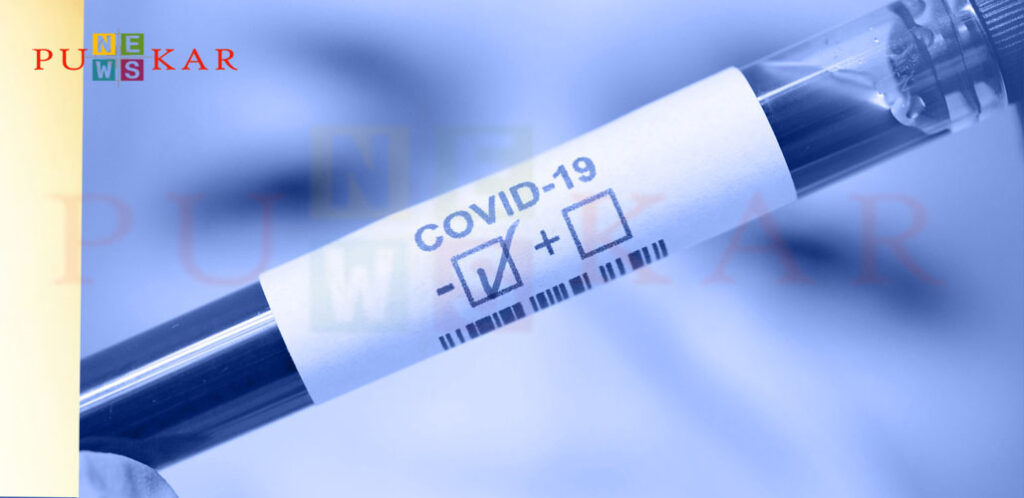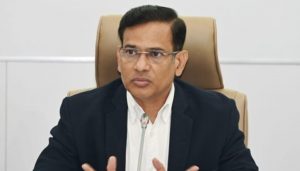COVID-19 doubling time in Pune is 7 days, a little less than the rest of the country, observed IMCT Pune: MHA

The Joint Secretary informed that:
- Prime Minister interacted with the Chief Ministers of all the States through VC today. He told the Chief Ministers of the states – Sajag Rahein, Saket Rahe. The PM told CMs that the chain of transmission of the virus should be broken, strictly for districts falling in the red zone and orange zone. District administration of the Green Zone should focus on surveillance by being alert that so that new cases do not emerge. PM has said that other health facilities – such as dialysis, treatment of other diseases etc, do not have to be relaxed. Traditional medical system should continue their work. Our mantra should be transforming district from red zone to orange zone to green zone.
- COVID-19 does not see race, religion, colour, caste, creed, language or borders before striking. In this context, PM said, our response and conduct should attach primacy to unity and brotherhood.
Aggarwal underlined the importance of fighting the stigma associated with COVID-19:
- Our battle is with sickness, not with a sick person. Due to stigma, many times patients try to hide and avoid seeking timely treatment. This does not only bring harm to the patient but also harm to their family and to the whole society.
- We should avoid spreading misinformation and panic. No community or area should be labelled for COVID-19 spread. In particular, healthcare and sanitary workers or police should not be targeted as they are there to help us.
- COVID-19 Stigma should be addressed through an intensive campaign. We have to understand that there is no risk of transmission from recovered patients. They, in fact, can be a potential source of healing for antibodies using plasma therapy.
- Our frontline workers are our “Protectors” and Champions. They are selflessly working to protect the vulnerable and take care of the ill – risking their own lives so that community can stay safe.
The Chairman of Empowered Group 5, Parameswaran Iyer gave a presentation on the state of supply and movement of essential items in the country. He pointed out specific areas such as movement of vehicles, labour and truck drivers, where the Group intervened. The Empowered Group 5 troubleshoots policy and implementation bottlenecks, collaborating with government and external stakeholders and makes recommendations in order to ensure smooth functioning of supply chain and logistics of essential items. While giving a presentation on improvement of key supply chain indicators from March 30 to April 25, he stated that his group tracks key indicators and briefed:
- There has been significant improvement in movement of food and pharmaceutical products. 79% of mandis are operational as on date – the number has gone up from 61% on March 30.
- Indian Railways has done a tremendous job; percentage of traffic handled by ports has also increased. Besides, India Post, IRCTC and Lifeline Udan are some of the various government organizations which are working day and night to ensure availability of essential items to all.
- Prices are stable, large scale distribution under Pradhan Mantri Garib Kalyan Yojana has been taking place and daily cooked meals are being served to 1.5 crore people. Availability of milk and LPG cylinders too is satisfactory.
- Key indicators related to food supply show that the availability of essential food items has improved consistently.
- In collaboration with Ministry of Agriculture & Farmers Welfare, the Empowered Group 5 has been operating a portal for supply of excess produce, connecting states which have excess supply with buying states who need food products.
Sharing some of the commendable stories from the ground, Iyer stated instances of 8 Anganwadi teachers from Telangana feeding migrant workers, Jharkhand ensuring door-step delivery of fresh vegetables and Indian Air Force’s Operation Sanjeevani by which tons of essential medicines and consumables have been air-lifted and delivered to Maldives.
Stating that MHA is continuously monitoring the implementation of lockdown, Joint Secretary, Ministry of Home Affairs, Ms. Punya Salila Srivastava representative stated:
- For easing the economic system and providing some facilities to the citizens, permissions for certain movements have been allowed during the course of lockdown. By 26th April, more than 80% wheat harvesting has been completed. More than 2000 (which is about 80%) mandis have started working. Buying of pulses and oilseeds is continuing. Kisan Rath app has simplified the buying and selling between traders and farmers. More than 80,000 farmers and 70,000 traders are using Kisan Rath app.
- Through MNREGA, works related to large community assets like water conservation and irrigation have started, employing about 2 crore labourers. Construction works in rural sector, brick factories and road development projects are employing local as well as migrant labourers.
- According to survey, more than 60% food processing units have become operational. 2825 units in SEZs and 350 export-oriented units have started functioning.
- It is important to observe safety and national directives and orders about wearing masks, social distancing norms and health protocols in all these works.
- The Inter Ministerial Central Teams formed by MHA under Disaster Management Act, 2005, have reached their stated states and started working. We wanted to share the expertise of team members, consisting of senior administrative officers, disaster management experts and public health experts, with the states, so that both Centre and states can fight against COVID-19.
- The Pune IMCT visited Pimpri-Chinchwad, Haranwadi and Baramati containment zones. They also visited shelter camps of migrant labourers, vegetable markets, PDS shops, Zilla Parishad control room, nagar nigam war room, hospitals etc. ICMT found that COVID-19 doubling rate at Pune is 7 days, a little higher than the rest of the country and every 9 samples are found to be COVID-19 positive in Pune, while in the rest of India every 23 samples are found to be positive. IMCT has advised that high-risk persons should be identified fast; testing and surveillance should be increased and also contact-tracing is to be done fast. It is necessary to enforce protocols at places like slums and markets where social distancing is not being followed properly. Institutional quarantine instead of home quarantine should be stressed upon for slum areas. Many doctors, paramedics, police personnel, emergency items and service providers, vegetable and fruit shop owners have been found to be COVID-19 positive. It is of concern since these people meet a lot of people every day. IMCT has suggested that following of lockdown guidelines may be ensured so that they don’t fall prey to COVID-19 and become source of the virus unknowingly. The IMCT has interacted with Maharashtra CM, Maharashtra Home Minister and senior officers through video conferencing.
- The Jaipur IMCT has visited hospitals, quarantine centres, containment zones and migrant labourers’ relief camps. They have also held discussions with Chief Secretary and senior officers of Rajasthan. They have suggested that strict steps be taken to implement lockdown in the walled city, to improve the ration and essential items delivery system, to locate the quarantine centres further away from populated areas, to speed up test results and to identify non-COVID health care centres so that people may be able to avail facilities for other treatments.
- Both the IMCTs found that local administration is working well and their suggestions will lead to improving the situation. It is important that every state implement lockdown rules in a strict manner.
Replying to a media query regarding purchase of Rapid Antibody Testing Kits which have been found to be faulty, the Joint Secretary clarified that the testing kits were purchased by following due process. Tender was awarded to the L1 vendor based on technical evaluation of Rapid Testing Kits, considering the parameters sensitivity and specificity, based on certificates submitted by the vendors. Later, when complaints from the field arose, ICMR reacted promptly and cancelled the orders. No payment was made to the vendors, since due process was followed and no advance payment was made, said the Joint Secretary. Required action has been taken against those vendors who either provided incorrect data or whose products did not perform in the field as specified. A detailed press release on the same has been issued, which can be found here.
Responding to a question on the number of COVID cases in Maharashtra, Aggarwal informed that Central Teams have been discussing the matter with the highest level at the state government and ensuring that required processes as part of containment strategy, such as surveillance, contact tracing and treatment, are followed. Noting that the challenge becomes bigger where population density is high, he added that the actions have been yielding some positive results as well.
On testing capacity, the Joint Secretary reiterated that RT-PCR is the gold standard test for detecting COVID-19. “There is adequate number of testing kits for conducting RT-PCR COVID-19 tests as per our testing strategy. Moreover, we have also ensured required geographical dispersion, ensuring adequate availability in each region. We are able to test all samples as per our sampling criteria, even without using our full capacity. There is no dearth of planning and organization of testing kits across the country.”
On the provision of medical services to non-COVID patients, the Joint Secretary informed that states have been told and guidelines have been issued stating that all non-COVID medical services including immunization services, dialysis, maternal and child health services, treatment for cancer, TB and cardiac diseases should be smoothly provided to people in non-COVID hospitals, while normal services can be availed using telemedicine as well.





